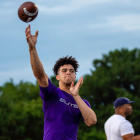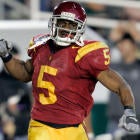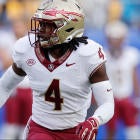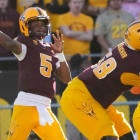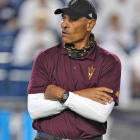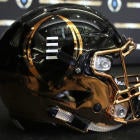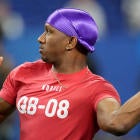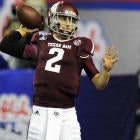A group of university faculty members, disturbed by how they say college football and basketball players are treated academically and economically, announced Thursday a national coalition to support recognizing those players as employees.
The College Athletes Rights and Empowerment Faculty Coalition (CARE-FC) said it will work with football and basketball players “who seek relief from the fraudulent business practices used by college sport organizations” and educate policy makers about “exploitative” college sport industry. CARE-FC said college sports’ business practices rob athletes of basic civil rights and should be paid for their labor, work in a safe environment, be protected when injuries occur, and “be treated with human dignity.”
The coalition’s co-founders are two high-profile advocates for college athlete rights: Ellen Staurowsky, a Drexel University professor who has researched college sports for several decades; and Richard Southall, director of the College Sport Research Institute at the University of South Carolina. Nineteen faculty members from around the country have so far signed their name as part of CARE-FC.
“We want to actively reach out to players and engage in discussions with them in a collaborative way to let players on campuses know there are faculty members who stand in support with them regarding their concerns, and to also let them know we may have some expertise that lends to the challenges,” Staurowsky said.
The coalition comes as the waiting game continues for a ruling by the National Labor Relations Board on an appeal by Northwestern regarding player unionization. Last March, NLRB regional director Peter Sung Ohr determined that Northwestern football players are employees and eligible to vote on forming a union. The decision could set a precedent for private universities.
Northwestern football players held an election last April and those ballots were impounded pending the university’s appeal to the NLRB’s five-member board. The delay on the appeal ruling has lasted almost a year. Unions tend to be a political lightning rod.
“In some ways, I really think the delay in that decision is reflective of the powerlessness these athletes have,” Staurowsky said.
Since the initial NLRB ruling, the states of Michigan and Ohio have made efforts to prevent college athletes from forming unions. Ohio lawmakers passed a budget proposal in June that says college athletes are not public employees under state law.
Michigan quickly passed a law in December with its lame-duck legislature that now makes it illegal for athletes at Michigan’s public universities to join a union. Supporters of the Michigan law have said it reinforces the idea that college athletes are students first and should focus on the classroom.
Meanwhile, a bill in Connecticut was recently proposed that would allow for some college athletes to form a union. Whether the bill ever passes remains to be seen.
The Michigan law “should be concerning to all of us, the idea that a state legislature could reach in and create a different class of citizens,” Staurowsky said. “I think it’s deeply concerning and speaks to the very reason why we as faculty feel we have to speak up and use the resources we have.”
CARE-FC has support from university professors at Drexel, South Carolina, Maryland, Connecticut, Massachusetts, Western Illinois, George Mason, Georgia, Eastern Michigan, Kutztown State, Michigan State, Western Carolina, Pacific, Texas A&M and Wake Forest. The coalition plans to develop relationships with the National College Players Association and College Athlete Players Association — the groups run by Ramogi Huma, who is leading player union efforts — and player associations in pro sports.
The NCAA and its universities have implemented or discussed some health protections and new benefits for players, such as allowing a cost of attendance stipend. Athletes now have a portion of the vote in the NCAA governance structure.
Very few leaders in college sports believe internal changes will quiet the outside noise, but they are outspoken against players becoming employees. In recent interviews, several commissioners described legal threats as the biggest risk to hurting college football’s popularity.
“You just hope that fans generally don’t get fatigued with all of the legal issues and debates about whether players are employees, whether they should be paid,” ACC commissioner John Swofford said. “All of the fan feedback and surveys I’ve seen seem to indicate the American public and college sports fans want to see college players and by and large believe they are going to school and part of the collegiate experience. If that changes dramatically, I think that will negatively impact how people view college sports in the long run.”
Said Pac-12 commissioner Larry Scott: “The USFL and XFL weren’t very successful for a reason. The D-League isn’t very successful for a reason. The public isn’t very interested in development or semi-pro sports. The plaintiffs would like to turn college sports into semi-pro sports. I think that would kill college football or college basketball.”
Staurowsky, who testified for the Ed O’Bannon plaintiffs in their victory against the NCAA at a trial last summer, said she didn't cavalierly reach her conclusion that athletes should be employees.
“So much of our discussion around whether football or basketball players should be employees evokes this sense of, ‘They wouldn’t be students anymore,’” Staurowsky said. “Sixty-five percent to 80 percent of all undergraduates earn a paycheck at some kind of job. This idea that if you advocate for employee status for athletes means you’re suggesting the academic part of it doesn’t matter, it seems very foreign to me as a researcher who has studied these issues a long time.”












